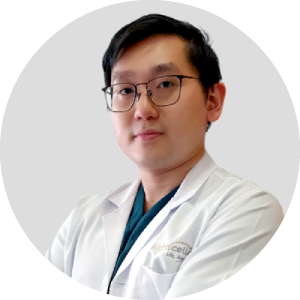Dementia and Alzheimer’s Disease
By Dr Choo

What is Dementia?
Dementia is a broad umbrella term and a syndrome which consists of a constellation of symptoms due to underlying brain degenerative process, but it is not a diagnosis in itself. The diagnosis of dementia often means the patient’s symptoms have very much affected their activity of daily living such as being unable to manage finances, attend appointments or even prepare a meal.
Prevalance of Dementia in Malaysia
In the year of 2020, about 204,000 people in Malaysia was diagnosed with dementia and needs 24-hour care. This number is projected to go up to 637,500 in 2050. About 14.3 % of the population above 60 years old has dementia. According to statistics from the US, this number goes up to 32 % in the population aged 85 years and above. In China, in the year 2019, Alzheimer’s disease and dementia was ranked 5th in the top causes of death.
What are the Common Types of Dementia?
Alzheimer’s disease (AD) is a neurodegenerative disease responsible for 60-70% of the 50 million cases of dementia worldwide. It is characterized by neuronal cell death, shrinkage of brain tissue, and progressive cognitive, motor, and behavioral impairment, which often leads to death.
Approximately 60-70 % of all dementias are due to Alzheimer’s disease. The second most common is vascular dementia, which sometimes also occurs in tandem with Alzheimer’s disease, hence the term mixed dementia. Other types of dementia include: Lewy body dementia, frontotemporal lobe degeneration, and dementia due to other causes (nutritional/electrolyte, thyroid, tumour, poison/medication induced). AD is a neurodegenerative disease characterized by the accumulation of extracellular amyloid plaques primarily composed of amyloid-beta (Aβ) peptides and intracellular neurofibrillary tangles (NFTs) of hyperphosphorylated tau protein.

Source: Alzheimer’s Association
What are the Symptoms of Dementia?
Typical symptoms include:
· Memory lapses
· Forgetfulness
· Visual-spatial dysfunction
· Aphasia
· Loss of concentration
· Vision dysfunction
Is Dementia Reversible?
As of today, disease-modifying treatments capable of altering the underlying disease pathology of AD are not available.
What You Can Do to Prevent Dementia?
Prevention strategies include having adequate and restful sleep (deep sleep), cultivating brain stimulating hobbies, having regular meaningful social interactions, having a balanced diet, exercising regularly, avoiding overconsumption of alcohol, optimal management of non-communicable disease and preventing head injuries.
Sleep Well – Reduce Your Risk of Dementia and Death
A research at Harvard Medical School found that individuals that slept 5 hours or less were twice as likely to get dementia and die. A multinational study (France, UK, Netherlands, Finland) found that sleeping 6 hours or less increased risk for dementia by 30 %. One study from Toronto and Chicago even found that in those at higher genetic risk for Alzheimer’s, just by having enough sleep was enough to reduce the likelihood of getting the disease, and was correlated with reduced density of neurofibrillary tangles.
Stem Cells Therapy & Electric Potential Therapy for Dementia
Currently, clinical studies are investigating the role of Mesenchymal Stem Cells (MSCs), exosomes and electric field therapy on prevention of Alzheimer’s Disease, dementia and other neurodegenerative disorders with promising results.
Mesenchymal Stem Cells Slow Dementia Progression
Mesenchymal stem cells (MSCs) are a group of multipotent stem cells capable of differentiating into nonmesenchymal lineages. MSCs are considered a very promising approach to stimulate neuroregeneration due to their immunomodulatory properties and high biosafety but also because of their ability to synthetize neurotrophic and proangiogenic factors. In AD, stem cell therapies have attempted to replace neurons that have been impaired or lost. MSC-based therapies have shown potential to restore damaged neural tissue as well as slow disease progression. In AD models, the reduction of Aβ plaques, β-secretase, and tau hyperphosphorylation as well as the reversal of microglial inflammation, and the stimulation of anti-inflammatory cytokines are among the mechanisms postulated to have a therapeutic effect in MSC therapy.

Mesenchymal Stem Cells are multipotent cells that can differentiate into a variety of cell such as fat cells, nerve cells, liver cells, muscle cells, heart cells, bone cells, and cartilage cells.
Electric Field Therapy – Improve Sleep and Reduce Risk of Dementia
Electric Field Therapy was shown to disrupt the process of amyloid aggregation, which is a substance that accumulates in the brain of those with Alzheimer’s disease, hence potentially slowing down disease progression. Electric field therapy has also been shown to improve sleep in those with sleep disorders, indirectly also mitigating those individuals’ risk for Alzheimer/dementia.

Source: ACS Publications
In conclusion, MSC and Electric Field Therapy combination might be a novel approach to prevention and potentially treatment of Alzheimer’s Disease or dementia.
Source:
- MOHAMAD ANUAR, Mohamad Fuad et al. Prevalence of Dementia in Malaysia: A Systematic Review. Journal of Health Management, [S.l.], v. 18, n. 1, p. 78-86, july 2022. ISSN 1823-5735. Available at: <https://myjms.mohe.gov.my/index.php/johm/article/view/18908>. Date accessed: 07 feb. 2023.
- Andrew E. Budson, M.D. (2021) Sleep well – and reduce your risk of dementia and death, Harvard Health. Available at: https://www.health.harvard.edu/blog/sleep-well-and-reduce-your-risk-of-dementia-and-death-2021050322508 (Accessed: February 7, 2023).
- Hernández AE, García E. Mesenchymal Stem Cell Therapy for Alzheimer’s Disease. Stem Cells Int. 2021 Sep 1;2021:7834421. doi: 10.1155/2021/7834421. PMID: 34512767; PMCID: PMC8426054.
- Ohtsuki T, Nabeta T, Nakanishi H, Kawahata H, Ogihara T, Morishita R, Aoki M. Electric Field Exposure Improves Subjective Symptoms Related to Sleeplessness in College Students: A Pilot Study of Electric Field Therapy for Sleep Disorder. Curr Med Chem. 2017 Apr;17(1):37–48. doi: 10.2174/1871522217666170815163329. Epub 2017 Apr. PMCID: PMC5740494.
- Jahnu Saikia, Gaurav Pandey, Sajitha Sasidharan, Ferrin Antony, Harshal B. Nemade, Sachin Kumar, Nitin Chaudhary, and Vibin Ramakrishnan. Electric Field Disruption of Amyloid Aggregation: Potential Noninvasive Therapy for Alzheimer’s Disease. ACS Chemical Neuroscience 2019 10 (5), 2250-2262
DOI: 10.1021/acschemneuro.8b00490
